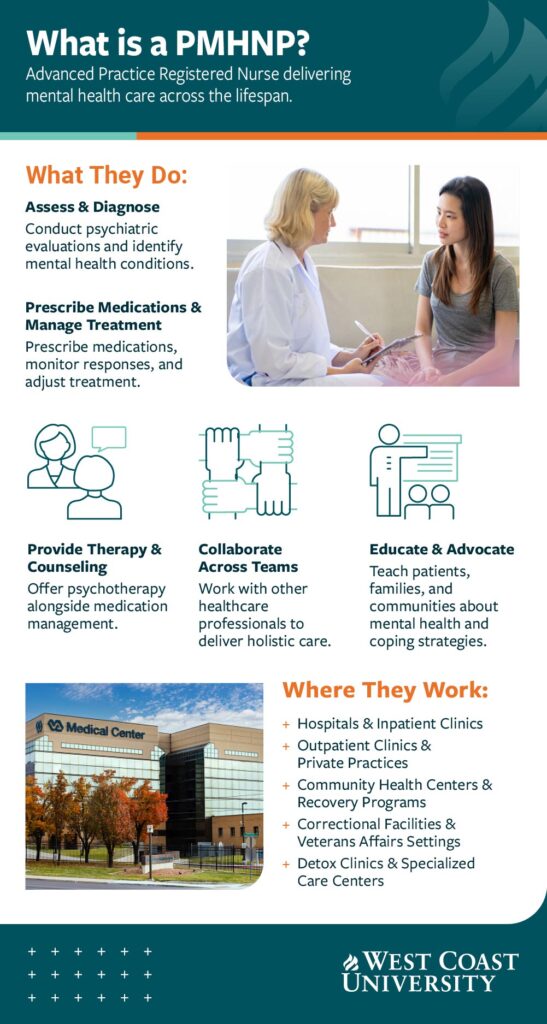PMHNPs (Psychiatric Mental Health Nurse Practitioners) are advanced practice registered nurses who specialize in providing mental health and psychiatric care. They are trained to diagnose and treat various mental health conditions, prescribe medications, offer therapy, and provide holistic care to patients across the lifespan.
Check Out the Career Guide: How to Become a Psychiatric Mental Health Nurse Practitioner in California
PMHNP Responsibilities
A PMHNP’s day-to-day duties may vary based on their work environment. Generally, PMHNP responsibilities include:
- Evaluating patients’ mental health status through interviews, observations, and diagnostic tools
- Identifying psychiatric disorders such as depression, anxiety, bipolar disorder, and substance use disorders
- Creating individualized care plans that may include psychotherapy, medication management, and lifestyle interventions
- Providing psychotherapy, including cognitive-behavioral therapy (CBT), dialectical behavior therapy (DBT), and other evidence-based modalities
- Prescribing and monitoring medications, adjusting dosages, and managing side effects
- Working alongside psychiatrists, psychologists, social workers, and primary care providers to ensure holistic patient care
- Educating patients and families about mental health, treatment, and coping strategies
- Responding to acute mental health crises, including suicidal ideation or psychotic episodes, and coordinating appropriate care
Where They Work
PMHNPs work in a variety of healthcare settings, including but not limited to:
- Hospitals and clinics
- Inpatient and outpatient centers
- Physician’s offices
- Private practices
PMHNP Education
To become a PMHNP, you must hold at minimum a master’s degree in psychiatric-mental health care. Registered nurse (RN) licensure is required to enroll in an MSN program. Some institutions offer RN to MSN (Master of Science in Nursing) programs that allow you to earn your master’s degree without completing a bachelor’s program.
In addition to coursework, you’ll need to complete a set number of clinical hours in a real-world healthcare setting. There may be additional hands-on requirements depending on your program. For example, WCU’s online MSN program requires you to participate in two On-site Intensive (OSI) weekends—which brings students to campus to learn and practice skills and competencies needed by nurse practitioners.
Upon completing an accredited program, you will be eligible to sit for the American Nurses Credentialing Center’s Psychiatric-Mental Health Nurse Practitioner Board Certification (PMHNP-BC) exam, which is required to practice in some states.
WCU offers the following programs with PMHNP specializations:
- RN to MSN – PMHNP (complete in as little as 32 months)
- MSN – PMHNP (complete in as little as 20 months)
- Post-Master’s Certificate – PMHNP (complete in as little as 16 months)
Curriculum
Review PMHNP curriculum offered in WCU’s MSN program.
Download the Infographic: What is a PMHNP?

PMHNP FAQs
What is the difference between a PMHNP and a psychiatrist?
While both professionals provide mental health care, psychiatrists are medical doctors (MDs) who can perform a broader range of medical procedures. PMHNPs are advanced practice nurses who focus on holistic care, including therapy and medication management.
Can PMHNPs prescribe medication?
Yes, PMHNPs have the authority to prescribe psychotropic medications, though prescriptive privileges vary by state regulations.
What populations do PMHNPs serve?
PMHNPs provide care across the lifespan, including children, adolescents, adults, and older adults, addressing a wide range of mental health conditions.
Source
https://www.bls.gov/ooh/healthcare/nurse-anesthetists-nurse-midwives-and-nurse-practitioners


